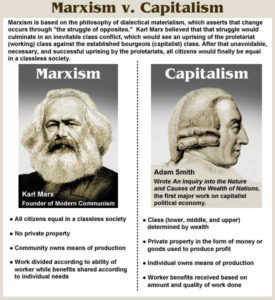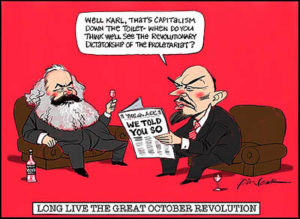Marx’s communism failed because
He conflated feudalism with modernism
To understand Marx’s philosophy, Marxism, we need to understand his worldview. A passive reader takes his {her} worldview with them when they view, read or even think about the past. Their worldview informs the context of events in terms of their current understanding. I believe Marx was also a victim of his worldview without his realization. Thus, the formation of his philosophy was a rejection of feudalism and the implementation of pure democracy.
Now, before you begin ranting about how Marxism is the enemy of democracy we need to realize that the problem lies in our definitions and our lack of understanding of European history.
Modern government-centric public education is really indoctrination that supports the goals of the government. All education {knowledge} is selectively edited to promote government and the values the government wishes you to accept, as opposed to those values the government wants you to reject. When Horace Mann studied the Prussian educational system and brought it to America in 1843, this was his goal. Prussia had developed an educational system designed to produce compliant citizens for the state. America was soon to follow suit especially with the rise of federalism after the War Between the States. Thus, much of history is tailored to promote a strong centralized government either nationalistic or internationalistic.
At the beginning of the 19th century Europe was still throwing off the reins of feudalism. This change came violently; first as the French Revolution which was less about freedom and more about implementing scientism. However, this democratic movement devolved into chaos giving rise to the reign of Napoleon Bonaparte. Wherever Napoleon conquered he implemented his modern Napoleonic Legal Codes which banished old feudalistic rules and traditions. His defeat and permanent exile in 1815, did not stop the social changes he had unleashed. European nations, empires and states struggled to replace feudalism with coherent, workable forms of government. What we fail to realize is that governments do not form without economies; the two are inseparable.
For example, many who call themselves capitalists today look back to Adam Smith as the foundation Western economics. In fact, Adam Smith was not an economist; he was a philosopher and his book was about how to form an utopian government including its economic foundation. In one sense he also advocated throwing off the heavy controlling hand of feudalism allowing commerce to flourish which would also promote better government along with improving the lot of participating citizens. His free enterprise philosophy today is mistakenly called capitalism, a term not even Marx used {Origins of the Word Capitalism}. Capitalism is not free enterprise or laissez faire economics but control of capital by the few for their own goals; in other words, a type of feudalism.
Marx lived during this time of great confusion and searching of government models that would both promote economic energies and governmental powers. Many competing philosophies were developed. Marx did not take into account his own feudalistic worldview. His idea of the bourgeoisie is nothing more than the feudal nobles who control all means of production simply because they were entitled by birth. The proletariats were those who worked to support the corrupt bourgeoisie. Since there were more proletariats than bourgeoisie the proletariats should rise up and work for themselves. Thus, when his philosophies were actually implemented in Russia and China the proletariats did rise up, the feudal serfs of the land. Marx’s theories worked, his own understanding was skewed. His predecessors sought to correct his theories working under the same delusion. The workers were not the peasants. The workers were benefitting from free enterprise improving their lot in life for the first time in the history of man. Thus, during World War I the workers fought to maintain their social order by enlisting and fighting for their respective governments.
But, European nations were not content with free enterprise economics. Governments sought to increase their power by taxing economics in the form of tariffs. Thus, the fledging free enterprise or laissez faire system was co-opted by newly form nation-states. A series of trade wars ensued in the form of restrictive tariffs against each other. This throttled the workers upward mobility, frustrating them and forcing them to find other means of improving their lot in life. Marx was not the only socialist philosopher and governments paid heed to the simple fact that if you bribe citizens with governmental socialism they will be less inclined to overthrow that government. People demanded the vote and when they were properly tied to the state they were given the right to vote. Educational systems were put in place insuring the voters knew how to vote, for the most part {in a Gaussian Curve there are always outliers deviating from the mean}.
This is the very implementation of democracy, rule by the people {masses}. Plato correctly saw the danger of the masses in control of government. The would make decisions based not on what was good for society but on what would benefit them immediately. A tyrant was one from the masses who would lead them via a strong hand to obtain what was immediately best for him {them}. This form of rule quickly degenerated into chaos. Plato and most other informed men including Jefferson and Adams feared democracy. However, Marx loved democracy and codified it in his dictatorship of the proletariat. For, in essence, democracy is really tyranny of the majority without a fixed reference point; that is, there is no guiding moral principle other than “I want what I want when I want!” A dictatorship is required to keep the masses under control to prevent inevitable self-destruction; i.e., French Revolution. When the dictatorship fails the mob reasserts itself demanding change after change after change; i.e., implosion of the Union of Soviet Socialist Republics.
The political discussions in America, indeed, Western culture are not debates between a return to a republic governmental form versus socialism {democracy} as some believe. That discussion ended in America in 1865 when the authority of the federal government was brutally enforced over state governments. The federal state implementation of public education determined the morals and worldview {governmental socialism} of its citizens. This process became known as the Progressive Movement in America and was promoted by both Republicans (Theodore Roosevelt) and Democrats (Woodrow Wilson) even today: Presidents Bush and Obama. Thus, the real discussion is really between national socialism {Pledge of Allegiance} and international socialism {United Nations}. Even the very terms used demonstrate the essence of this discussion: capitalism versus Marxism.

Adam Smith did not promote Capitalism
Laissez Faire Prevented Monopolies
Progressivism, socialism, gained power because through restrictive tariffs businesses compliant with governments became monopolies able to raise prices while ignoring quality and control the wages of the work force via confiscatory income taxation by the government. By the end of the 19th century the fledging laissez faire system was destroyed and another form of feudalism in the form of democracy supported this reimplementation with the consent of the people {bribed and educated by governments}. The actual discussion today is whether there will continue to be national forms of socialism or an international socialism replacing nationalism; at least for the lost who know not God.
For the Christian this entire discussion should be understood but also non sequitur since we are to spread the Gospel regardless of which government is in place. However, everywhere I see Christians throwing away the Gospel to promote democracy which by definition is anti-God; i.e., man-centric and therefore anti-Gospel (Col 2:8-10). Lost people are even questioning their very essence in their search for meaning (Ro 1:18-32); yet, Christians offer little more than governmental laws that can be used against the spread of the Gospel. We should be offering them the hope of Christ (Col 1:24-29). We do not do this with laws but through the gentle defense of the truth that offers hope to those who have no hope; thus, Christ is glorified (1Pe 3:13-17). This is why we study all things to show ourselves approved unto God and having the wisdom to avoid these empty babbling that only promote ungodliness (2Ti 2:14-16).

